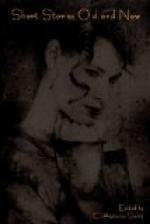Jess, the mare, had been sent, with her weather-worn cart, to Howgate, and had doubtless her own dim and placid meditations and confusions, on the absence of her master and Rab, and her unnatural freedom from the road and her cart.
For some days Ailie did well. The wound healed “by the first intention;” for as James said, “Our Ailie’s skin’s ower clean to beil.” The students came in quiet and anxious, and surrounded her bed. She said she liked to see their young, honest faces. The surgeon dressed her, and spoke to her in his own short kind way, pitying her through his eyes, Rab and James outside the circle,—Rab being now reconciled, and even cordial, and having made up his mind that as yet nobody required worrying, but, as you may suppose, semper paratus.
So far well: but, four days after the operation, my patient had a sudden and long shivering, a “groosin’,” as she called it. I saw her soon after; her eyes were too bright, her cheek colored; she was restless, and ashamed of being so; the balance was lost; mischief had begun. On looking at the wound, a blush of red told the secret: her pulse was rapid, her breathing anxious and quick, she wasn’t herself, as she said, and was vexed at her restlessness. We tried what we could; James did everything, was everywhere; never in the way, never out of it; Rab subsided under the table into a dark place, and was motionless, all but his eye, which followed every one. Ailie got worse; began to wander in her mind, gently; was more demonstrative in her ways to James, rapid in her questions, and sharp at times. He was vexed, and said, “She was never that way afore; no, never.” For a time she knew her head was wrong, and was always asking our pardon—the dear, gentle old woman: then delirium set in strong, without pause. Her brain gave way, and then came that terrible spectacle,—
The intellectual power, through
words and things,
Went sounding on its dim and perilous
way,
she sang bits of old songs and Psalms, stopping suddenly, mingling the Psalms of David and the diviner words of his Son and Lord, with homely odds and ends and scraps of ballads.
Nothing more touching, or in a sense more strangely beautiful, did I ever witness. Her tremulous, rapid, affectionate, eager, Scotch voice,—the swift, aimless, bewildered mind, the baffled utterance, the bright and perilous eye; some wild words, some household cares, something for James, the names of the dead, Rab called rapidly and in a “fremyt” voice, and he starting up surprised, and slinking off as if he were to blame somehow, or had been dreaming he heard; many eager questions and beseechings which James and I could make nothing of, and on which she seemed to set her all, and then sink back ununderstood. It was very sad, but better than many things that are not called sad. James hovered about, put out and miserable, but active and exact as ever; read to her, when there was a lull, short bits from the Psalms, prose and metre, chanting the latter in his own rude and serious way, showing great knowledge of the fit words, bearing up like a man, and doating over her as his “ain Ailie.” “Ailie, ma woman!” “Ma ain bonnie wee dawtie!”




